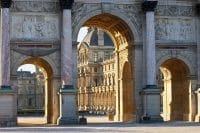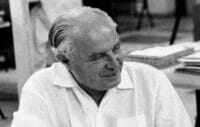
Stile Rococò: Come si Distingue in Architettura, Arredamento e Pittura
Stile Rococò: Nascita e Sviluppo Il Rococò, come riflesso delle tendenze, dei gusti e del modo di vivere della Francia…
annni 60
Height: 38.98 in (99 cm)Width: 28.75 in (73 cm)Depth: 1.58 in (4 cm)
A stylish large wall mirror, designed by Luciano Frigerio and manufactured in Italy in the Sixties, features brass in its original patina, and the original glass is in very good condition overall. The wall mirror is a true testament to the design ethos of that era. Luciano Frigerio, a renowned Italian designer, created this mirror with a perfect blend of craftsmanship, elegance, and functionality. The wall mirror features a square shape with brass curves inspired by the Futuristic Space Style of the time. It is a quality and highly decorative mirror. Its clean lines and geometric simplicity contribute to its timeless appeal. The mirror’s size is typically generous, allowing for a substantial reflective surface that adds depth and light to any room. Crafted entirely from solid brass, this mirror exudes a sense of luxury and durability. Brass was a favored material during the era for its warm and rich golden hues, making it a perfect choice to infuse a touch of opulence into the design. The solid brass construction ensures the mirror’s longevity, ensuring it stands the test of time. Frigerio’s attention to detail is evident in the mirror’s frame, adding depth and visual interest to the mirror and elevating it from a mere functional object to a statement piece of art. The wall mirror by Luciano Frigerio perfectly captures the essence of the era’s design aesthetics. Its solid brass construction, meticulous detailing, and timeless design make it an iconic piece that stands out in any interior setting.

Stile Rococò: Nascita e Sviluppo Il Rococò, come riflesso delle tendenze, dei gusti e del modo di vivere della Francia…

Lo stile Impero, con la sua magnifica fusione di maestosità e grazia, rimane un’icona dell’arredamento classico, esercitando un fascino senza…

Giò Ponti è uno degli artisti che maggiormente ha dominato il dopoguerra italiano, facendosi portavoce di importanti innovazioni nel mondo…
hanno visualizzato questo articolo negli ultimi 30 minuti.